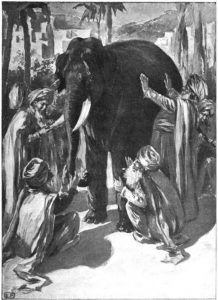The large majority or possibly all people are unable to accept or even process data, even personal experiences, perceived to contradict their worldview. This is common human behavior. It is not a function of intelligence, education, social status, or any other obvious marker. In fact, highly educated intelligent people may be more prone to it as they are better equipped — like a good lawyer — to rationalize away obviously contradictory data or experiences.
One should not think of our “worldview” as a rigorous axiomatic system like Euclid’s Geometry or the precise logically consistent rules of games like chess. It is not rational in the usual sense. It appears to be a hodgepodge of elements and can often contain contradictory elements. It is highly social in nature, being comprised of direct personal experience and the claims of authority figures in groups we identify with such as our family, tribe or nation, profession etc. It is closely associated with our sense of group identity.
Many people can and do change their worldview but it usually follows sustained negative direct personal experiences over a period of years, very rarely less than six months. Data alone in the sense of books, newspaper articles, peer reviewed research papers, databases, spreadsheets etc. almost never changes the worldview.
Direct personal experiences, usually strongly negative, are the underlying cause in most cases. Once these have occurred and begin to work their way through the subconscious and conscious mind, the person will begin to seriously engage “data” whereas before they may not have even been able to “see” that very same data: ignoring it, dismissing it out of hand, reacting with great hostility to “obvious” baloney or lies.
It may be that an extreme traumatic event such as the loss of a loved one to an immediate negative reaction to a vaccine can cause an immediate change of worldview — less than six months — but this seems quite rare.
Beliefs about “science” and vaccines constitute a worldview or part of a worldview, especially for scientists, engineers and other technical people, for whom “science” constitutes an actual substitute for a religion or other spiritual beliefs.
Other psychological concepts such as “denial” and “cognitive dissonance” overlap with this concept of a rigid, difficult to change worldview. Cognitive biases seem strongest — most difficult to overcome — for elements of the worldview.
This behavior of the worldview in most, possibly all, people suggests that attempts to persuade others where the worldview of some or all may be involved should focus on drawing their attention to their own direct experiences, in-person experiments or demonstrations of contradictory phenomena, and persuading those for whom the issue is not connected to their worldview.

It is difficult, perhaps impossible, to distinguish true belief in a worldview from deliberate deception and fraud including “gaslighting” because the ability to perceive both experiences and “data” is substantially impaired. The “True Believer” genuinely cannot see obviously contradictory evidence that others can easily see.
Nor is there a sharp dividing line between true belief and fraud. Authority figures in the group may engage in Plato’s Noble Lies to protect the worldview (and often their power) not because they don’t mostly believe in the worldview but in the same way that parents simplify, hide, sugar-coat or flat out lie to children to protect them from complex or painful issues.
I have changed my worldview a few times (it is a rare occurrence). In all cases, the sequence of negative experiences preceded even conscious doubt of underlying assumptions in my worldview, by at least six months. The whole process took a couple of years in each case from start to finish.
Major scientific and technological breakthroughs frequently involve a change of worldview. The inventors and discoverers usually spend several years failing miserably before the flash of insight, the change of worldview occurs. The final flip can be quite fast but it is almost always preceded by long periods of failure. There are for example many accounts of the change of worldview, moment of insight, the “Heureka moment”, happening almost instantaneously on a contemplative walk or other break after a long period of hard but unsuccessful work.
Note that reading about the many failures of previous researchers does not lead the inventor or discoverer to abandon the prevailing wisdom of how to solve the problem. It usually appears to require personal repeated failure as well.
What does this mean both for persuading others and being sure of our own beliefs?
Direct personal experiences are more persuasive. Test your own beliefs if you can. In your own mind, clearly distinguish between the relatively small number of beliefs well founded in repeated clear direct personal experiences and those derived from others, generally external authorities in groups that you identify with.
This is easier said than done. For example, many people especially scientists and engineers are taught that it is “obvious” that the Earth is a sphere about 8,000 miles in diameter and believe it is obvious when in fact it is not — unless you have actually circumnavigated the Earth or flown on a space ship. Try demonstrating to yourself that the Earth is a sphere about 8,000 miles in diameter from only your own personal experience, not reciting claims by science popularizers such as the late Carl Sagan.
Get others to notice personal contradictory experiences and to test their beliefs first hand. This is not always possible. There is no guarantee of success. Remarkably we often consider elements of the worldview derived from the words of others (“everyone knows”) just as solid and true as those based on personal experience. Even more reliable in some cases — “how could everyone be wrong?” “How could all the experts be wrong?”
Psychoanalyzing people to their face is usually not persuasive. Most people find it offensive and patronizing. Most highly educated people are well aware of cognitive biases. It is in the news. Many are not aware there are social psychology studies that knowing about cognitive biases does not immunize you to them. Daniel Kahneman actually effectively retracted one chapter of his book which contained an obviously statistically under powered study. Even the experts are demonstrably vulnerable to confirmation bias and other cognitive biases.
https://replicationindex.com/category/kahneman/
Paradoxically, knowledge of cognitive biases including the extreme rigidity of the worldview provides a powerful set of tools to dismiss obviously contradictory experiences, evidence, and data. “I know about these biases and those nitwits over there do not. The data was cherry picked etc. etc.”
One should be cautious about accusing people of deliberate lying or gross stupidity where the worldview is likely involved as highly intelligent, educated “True Believers” are truly unable to see, accept or otherwise process contradictory data or even personal experiences. Nor is this unusual or pathological behavior. Most of us are True Believers in something.

One should also keep in mind the parable of the Blind Men and the Elephant when different worldviews seem grossly incompatible. Each blind man, having never encountered an elephant before and touching a different part of the elephant, describes the elephant as like a “snake”, “a tree”, “a sharp spear”, etc. It may be that each contradictory worldview is substantially incomplete. All have some truth and all are wrong.
In the case of the worldview, in contrast to other beliefs, we are unable to treat it as provisional, as possibly wrong. We are True Believers in our worldview and our group is obviously right.
(C) 2023 by John F. McGowan, Ph.D.
About Me
John F. McGowan, Ph.D. solves problems using mathematics and mathematical software, including developing gesture recognition for touch devices, video compression and speech recognition technologies. He has extensive experience developing software in C, C++, MATLAB, Python, Visual Basic and many other programming languages. He has been a Visiting Scholar at HP Labs developing computer vision algorithms and software for mobile devices. He has worked as a contractor at NASA Ames Research Center involved in the research and development of image and video processing algorithms and technology. He has published articles on the origin and evolution of life, the exploration of Mars (anticipating the discovery of methane on Mars), and cheap access to space. He has a Ph.D. in physics from the University of Illinois at Urbana-Champaign and a B.S. in physics from the California Institute of Technology (Caltech).


